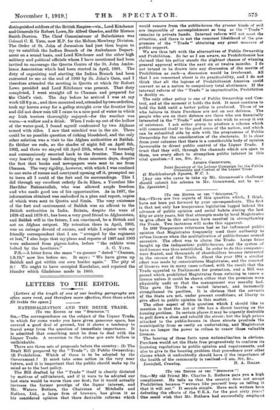LETTERS TO THE EDITOR.
[Letters of the length of one of our leading paragraphs are often more read, and therefore more effective, than those which fill treble the space.]
NATIONALIZATION AND THE DRINK TRADE. [To THE EDITOR Or THE " SPECTATOR:I
Sin,—The correspondence on the subject of the Liquor Trade, to which for some weeks you have given generous space, has covered a good deal of ground, but it shows a tendency to travel away from the question of immediate importance. It is admitted that something must be done to deal with the Liquor Trade. A reversion to the status quo ante beflu?n is unthinkable.
There are three sets of proposals before the country : (1) The Draft Bill prepared by the " Trade "; (2) Public Ownership; (3) Prohibition. Which of these is to be adopted by the Government P It must take some action in the very near future, and it is important that the public should make up its mind as to the best policy.
The Bill drafted by the " Trade " itself is clearly dictated by motives of self-interest, and if it were to be adopted our last state would be worse than our first; for it would actually increase the former prestige of the liquor interest, and Mr. Waters Butlers, the Chairman of Mitchells and Butlers, Ltd., a large firm of brewers, has given it as his considered opinion that those desirable reforms which
would remove from the public-house the grosser kinds of evil are impossible of accomplishment so long as the Trade " remains in private hands. Internal reform will not meet the situation, and there is not the remotest likelihood of the programme of the " Trade " obtaining any great measure of public support.
We are thus left with the alternatives of Public Ownership and Prohibition. So far as I am aware, no Prohibitionist has claimed that his policy stands the slightest chance of winning general approval within the next six or twelve months. I do not intend to be drawn into any discussion of the merits of Prohibition as such—a discussion would be irrelevant. All that I am concerned about is its practicability, and I do not think that all the legions of Prohibitionist America could convert us as a nation to compulsory total abstinence. If the internal reform of the " Trade " is impracticable, Prohibition is doubly so.
The only other policy is one of Public Ownership and Control, and at the moment it holds the field. It must continue to hold the field until a better policy is produced. Those of us who believe in State Purchase are not on our defence. The people who are on their defence are those who are financially interested in the " Trade " and those who wish to sweep it out of existence. I ask either group to produce a scheme which will commend itself to the good sense of the nation, and which can be submitted side by side with the programme of Public Ownership for the consideration of the electorate. It is clear from your columns that there is a considerable body of opinion favourable to direst public control of the Liquor Trade. I trust that they will, through the channels which are open to them, use every effort to strengthen public interest in this vital question.—I am, Sir, &c.,
45 Mecklenburgh Square, W.C. 1.
[Any one who cares to take up Mr. Greenwood's challenge should submit his scheme to Mr. Greenwood, not to us.— En. Spectator.]






































 Previous page
Previous page